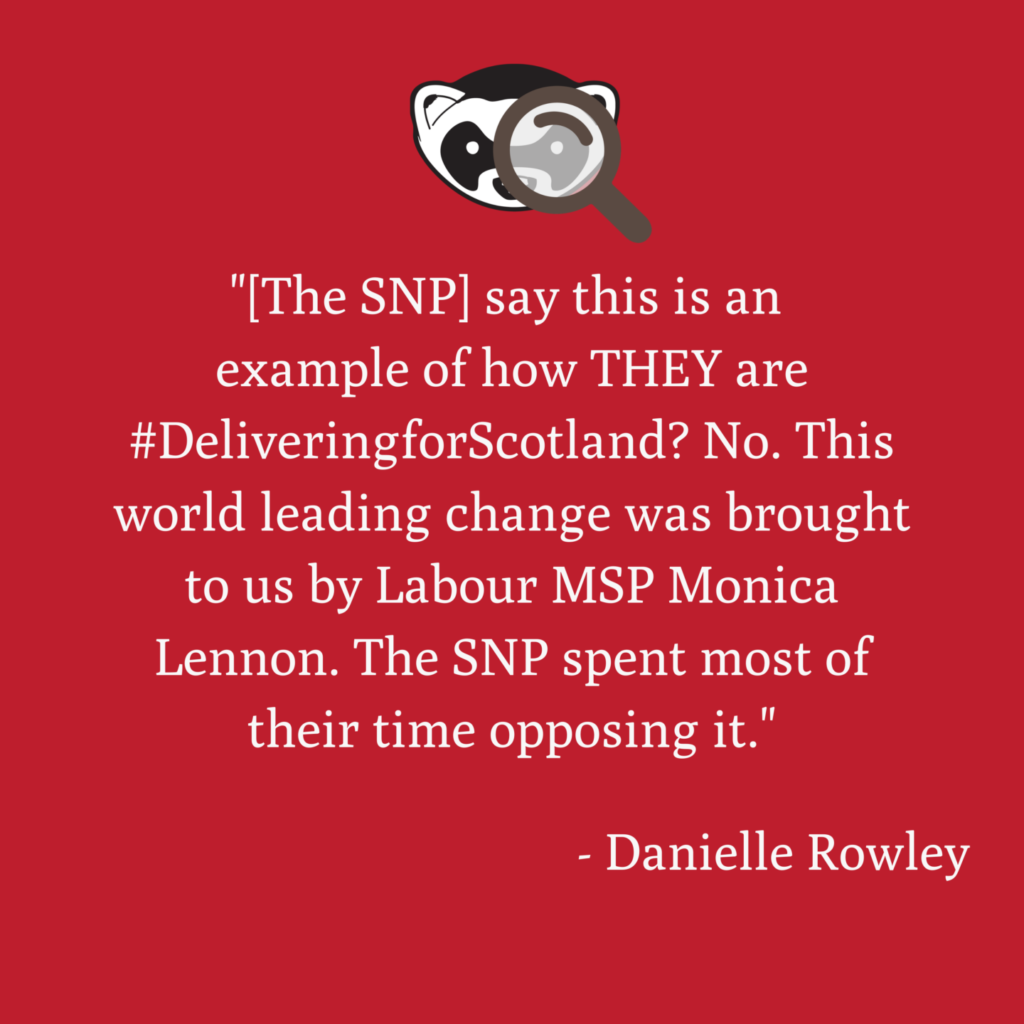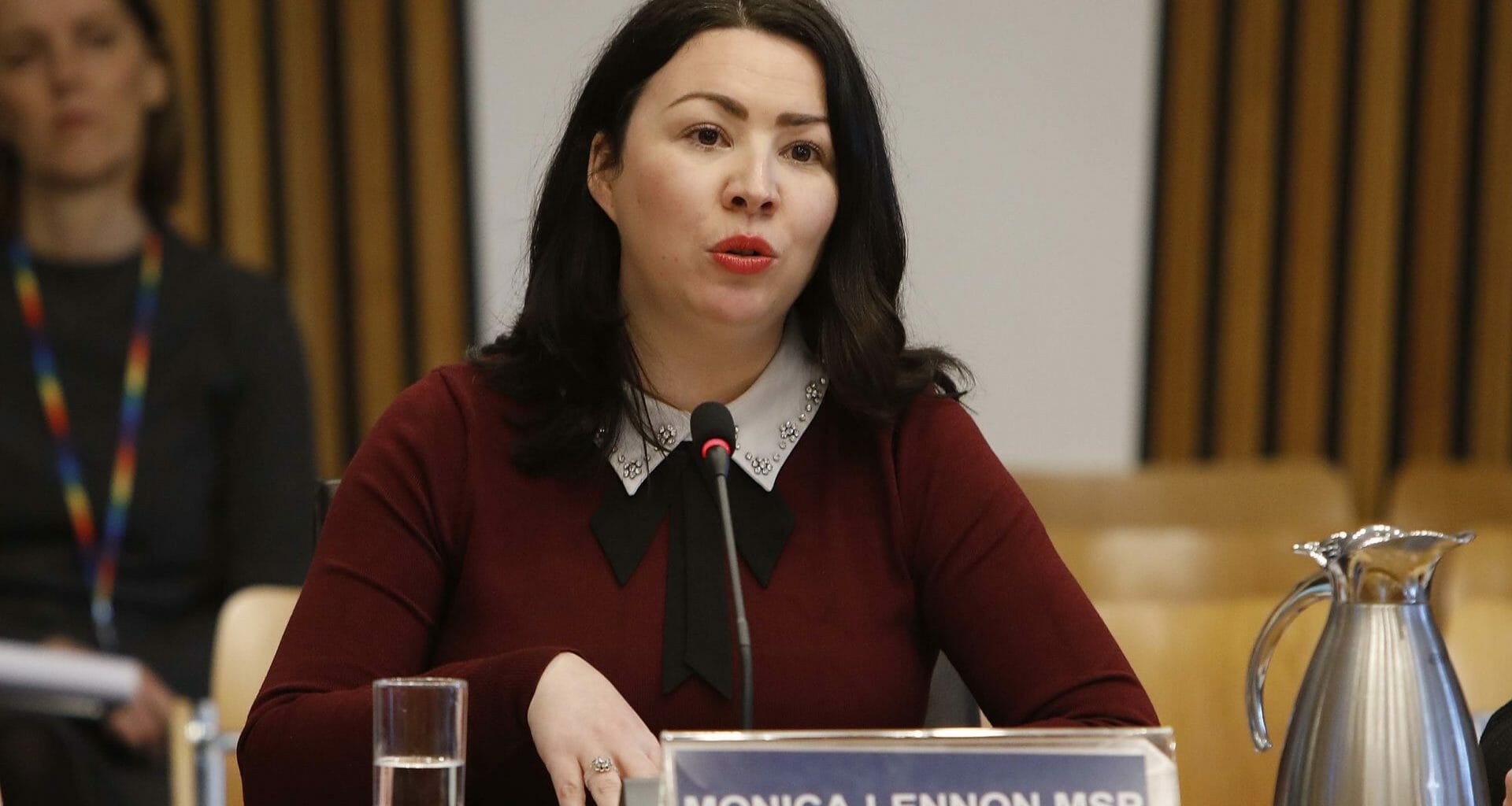Scotland made period products free to anyone who needs them in January this year.
The achievement was included in a tweet from the SNP’s official account on 24 February, in which the party cited the move as an example of them “delivering for Scotland”.
This was queried by former Labour MP Danielle Rowley, who claimed that the credit for the bill actually lay with Labour MSP Monica Lennon, and that the SNP had in fact “spent most of their time” opposing the legislation.

Ferret Fact Service looked at the claim and found it Half True.
Evidence
In November 2020 MSPs gave their unanimous backing to a bill that makes period products such as tampons and sanitary pads available free of charge to anyone who needs them. The bill passed into law on 12 January this year.
The SNP’s tweet was accompanied by the hashtag #DeliveringForScotland that stated “Scotland is leading the world in tackling period poverty”. The tweet linked through to a Delivering for Scotland page on the SNP website that lists “mak sanitary products available to all those who need them, free of charge” as one of the party’s “top achievements”.
The draft Period Products (Free Provision) (Scotland) Bill was introduced to the Scottish Parliament by MSP for Central Scotland Monica Lennon in April 2019.
Lennon first raised the issue of period poverty in parliament in 2016. During that debate SNP member Gillian Martin said the SNP national council had already passed a motion to “look into the possibility” of piloting a scheme that would offer free access to period products.
The Scottish Government funded a six-month pilot in Aberdeen the following year. In 2018 it began providing free sanitary products in schools, colleges and universities across Scotland.
When Lennon’s bill was introduced in 2019 First Minister Nicola Sturgeon said that while the government would “certainly look very carefully at the provisions of the bill” she was “100 per cent behind” what it was trying to achieve.
The bill received wide backing from a range of organisations including the Scottish Trades Union Congress, Scouts Scotland and the Young Women’s Movement.
At the beginning of February last year Holyrood’s Local Government and Communities Committee, which is led by SNP member James Dornan, refused to give the bill its backing. The committee said that, “whilst commending the intent of the bill”, it could not support it due mainly to uncertainty over costs. The financial memorandum accompanying the bill, it said, estimated that the scheme would cost £9.7m a year but the Scottish Government’s own calculations put the annual price-tag more than double that at £24.1m.
Of the committee’s seven members, five opposed the bill and two backed it. Of the five who opposed it, three – Dornan, Kenneth Gibson and Annabelle Ewing – are SNP members and two – Graham Simpson and Alexander Stewart – are members of the Conservative party.
Following the committee’s report, SNP communities and local government secretary Aileen Campbell highlighted potential issues with the bill. She noted there were “grave concerns” over the cost of the scheme and was also quoted as questioning whether people living outside Scotland may seek to access the products to sell at a discount elsewhere.
When the bill had its first reading in parliament later in February 2020 it received near-unanimous cross-party support. No members opposed it and Dornan was the only abstention. During the debate he repeated the committee’s stance of supporting the intentions of the bill while voicing concerns about how much it would cost to implement.
Ewing and Campbell voted in favour of the bill and Gibson was not present in the chamber.
A number of amendments were made to simplify the bill following the February vote. The aim was to give local authorities greater autonomy over how the scheme should be implemented as well as giving greater clarity around costs.
Following the amendments, the bill received the full backing of parliament in November 2020. The bill was enacted into law in January.
Ferret Fact Service Verdict: Half True
The Period Poverty Bill was not introduced to parliament by the SNP – Labour’s Monica Lennon was responsible for introducing and amending it. It is misleading for the party to suggest its government was behind the implementation of the law. However, the party did not oppose the bill at any stage. Three SNP MSPs on the Local Government and Communities Committee initially rejected the bill due to concerns over cost. Once the bill was amended it passed into law with the unanimous cross-party support of the parliament.

Photo thanks to Andrew Cowan/Scottish Parliament.














